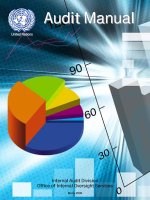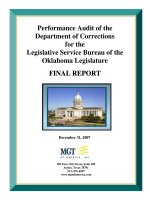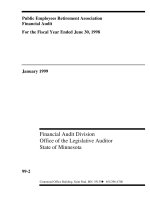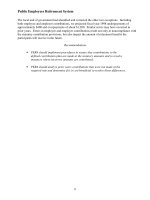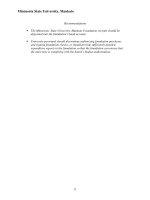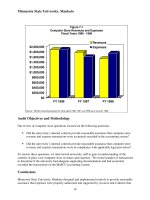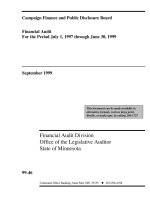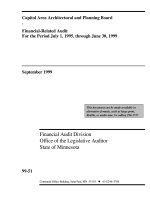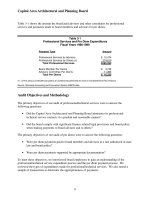Hennepin Technical College Financial Audit For the Period July 1, 1995, through June 30, 1998 July 1999 Financial Audit Division Office of the Legislative Auditor State of Minnesota_part1 ppt
Bạn đang xem bản rút gọn của tài liệu. Xem và tải ngay bản đầy đủ của tài liệu tại đây (209.68 KB, 10 trang )
Hennepin Technical College
Financial Audit
For the Period July 1, 1995, through June 30, 1998
July 1999
Financial Audit Division
Office of the Legislative Auditor
State of Minnesota
99-37
Centennial Office Building, Saint Paul, MN 55155 651/296-4708
SUMMARY
State of Minnesota
Office of the Legislative Auditor
1st Floor Centennial Building
658 Cedar Street • St. Paul, MN 55155
(651)296-1727 • FAX (651)296-4712
TDD Relay: 1-800-627-3529
email:
URL:
Hennepin Technical College
Financial Audit
For the Period July 1, 1995, through June 30, 1998
Public Release Date: July 16, 1999 No. 99-37
Background
Hennepin Technical College is part of the Minnesota State Colleges and Universities System
(MnSCU). MnSCU began operations on July 1, 1995, when the state universities, community
colleges, and technical colleges throughout the state merged under one governance structure.
HTC is a two-year college with campuses in Brooklyn Park and Eden Prairie. Dr. Sharon
Grossbach serves as president of the college.
Our audit scope covered the period July 1, 1995, through June 30, 1998. The objectives of our
audit were to gain an understanding of the internal control structure over the major financial
activities of the college and to determine if the college complied with material finance-related
legal provisions. The areas covered by our audit were tuition and fees, customized training and
fee based programs, employee payroll, administrative expenditures, and food service and
bookstore operations. We also reviewed the college’s internal controls over compliance with
federal student financial aid for fiscal year 1999.
Objectives and Conclusions
We concluded that Hennepin Technical College operated within its available resources and
generally operated in compliance with management's authorization and applicable legal
requirements for the items tested. Overall, the college designed and implemented internal
controls to provide reasonable assurance that its financial activities were properly accounted for
and accurately recorded on the accounting systems. However, we make recommendations for
improving bank account reconciliations and reducing the number of bank accounts used by the
college. The college designed and implemented controls in the business office, bookstore, food
service, and financial aid office to help ensure that assets were safeguarded, transactions
authorized, and financial activity accurately reported in the accounting systems. However, the
college needs to improve its management of third party accounts receivables, segregate duties
over tuition and customized training revenue, and improve procedures over transferring
customized training receipts from the Plymouth center to the Brooklyn Park campus. In
addition, the college needs to prepare financial statements for its bookstore and food service
operations and improve the review of bookstore and food service void and refund transactions.
In its audit response, Hennepin Technical College agreed with the audit findings and is taking
corrective action to resolve the issues.
STATE OF MINNESOTA
OFFICE OF THE LEGISLATIVE AUDITOR
JAMES R. NOBLES, LEGISLATIVE AUDITOR
Representative Dan McElroy, Chair
Legislative Audit Commission
Members of the Legislative Audit Commission
Mr. Morrie J. Anderson, Chancellor
Minnesota State Colleges and Universities
Members of the Minnesota State Colleges and Universities Board of Trustees
Dr. Sharon Grossbach, President
Hennepin Technical College
We have audited selected areas of Hennepin Technical College for the period July 1, 1995,
through June 30, 1998, as further explained in Chapter 1. Our audit scope included tuition and
fees, customized training and fee based programs, employee payroll, administrative expenditures,
and food service and bookstore operations. We also reviewed the college's internal controls over
compliance with federal student financial aid for fiscal year 1999.
We conducted our audit in accordance with generally accepted auditing standards and
Government Auditing Standards, as issued by the Comptroller General of the United States.
Those standards require that we obtain an understanding of management controls relevant to the
audit. The standards require that we design the audit to provide reasonable assurance that
Hennepin Technical College complied with provisions of laws, regulations, contracts, and grants
that are significant to the audit. Management of the college is responsible for establishing and
maintaining the internal control structure and complying with applicable laws, regulations,
contracts, and grants.
This report is intended for the information of the Legislative Audit Commission, the management
of Hennepin Technical College, and the members of the Minnesota State Colleges and
Universities Board of Trustees. This restriction is not intended to limit the distribution of this
report, which was released as a public document on July 16, 1999.
James R. Nobles Claudia J. Gudvangen, CPA
Legislative Auditor Deputy Legislative Auditor
End of Fieldwork: April 6, 1999
Report Signed On: July 13, 1999
1ST FLOOR SOUTH, CENTENNIAL BUILDING 658 CEDAR STREET ST. PAUL, MN 55155
TELEPHONE 651/296-4708 TDD RELAY 651/297-5353 FAX 651/296-4712 WEB SITE
Hennepin Technical College
Table of Contents
Page
Chapter 1. Introduction 1
Chapter 2. Financial Management 3
Chapter 3. Tuition and Fees 7
Chapter 4. Employee Payroll 11
Chapter 5. Administrative Expenditures 13
Chapter 6. Enterprise Fund Revenues and Expenses 15
Chapter 7. Student Financial Aid 19
Status of Prior Audit Issues 21
Hennepin Technical College's Response 23
Audit Participation
The following members of the Office of the Legislative Audit prepared this report:
Claudia Gudvangen, CPA Deputy Legislative Auditor
Tom Donahue, CPA Audit Manager
Pat Ryan Auditor-In-Charge
Steve Johnson, CPA Auditor
Jill Weber Auditor
Exit Conference
We discussed the findings and recommendations with the following representatives of Hennepin
Technical College and the MnSCU system office at the exit conference held on July 8, 1999:
MnSCU System Office:
Andrew Boss Board Trustee
Rosalie Greeman Associate Vice Chancellor for Financial Reporting
Debbie Winter Director of Campus Accounting
John Asmussen Executive Director, Internal Auditing
Janet Knox Regional Audit Coordinator
Hennepin Technical College:
Sharon Grossbach President
Diane Paulson Vice President of Administrative Services
Hennepin Technical College
1
Chapter 1. Introduction
Hennepin Technical College is a two-year college whose mission is to provide a quality education
for employment and a lifetime of learning. The college’s main campuses are located in Brooklyn
Park and Eden Prairie. In addition, the college has customized training centers in Hopkins and
Plymouth. On July 1, 1995, the college became part of the newly formed Minnesota State
Colleges and Universities (MnSCU). Minnesota Laws of 1994, Chapter 532, Section 9,
Subdivision 1, authorized the transfer of real property, personal property, improvements, and
attachments related to technical colleges to the state. Prior to the MnSCU merger, the college
operated as part of Intermediate School District No. 287. As explained in Chapter 2, the college
and Intermediate School District No. 287 continue to share various services under a joint powers
agreement.
The college offers several degrees, certificates, and diplomas. The college also offers customized
educational options on each of its campuses. The full-time equivalent student population at the
college was 3,200 for the 1997-98 school year. Dr. Sharon K. Grossbach serves as the president
of the college.
Table 1-1 provides a summary of the college's sources and uses of funds reported in the General
Fund, Special Revenue Funds, and Enterprise Funds for fiscal year 1998.
Hennepin Technical College
2
Table 1-1
Sources and Uses of Funds
Fiscal Year Ended June 30, 1998
Special
General Revenue Enterprise
Fund Funds Funds
Beginning Fund Balance $ 7,128,965 $ 119,321 $ 993,009
State Appropriation 20,298,413 0 0
Revenues:
Tuition and Fees 6,743,037 107,895 0
Customized Training 1,479,863
State Grants 2,000 0 0
Federal Grants 0 2,336,831 0
Sale of Goods 379,773 0 1,913,819
Other 1,359,403 549,336 0
Subtotal Revenues $ 9,964,076 $2,994,062 $1,913,819
Total Resources $37,391,454 $3,113,383 $2,906,828
Expenditures:
Employee Payroll $18,573,291 $ 906,434 $ 538,808
Purchased Services 4,561,263 358,161 98,856
Supplies 3,320,277 83,540 1,212,117
Equipment 1,908,418 85,469 0
Improvements 651,196 0 63,021
Financial Aid 0 1,553,437 0
Other 194,133 102,680 14
Total Expenditures $29,208,578 $3,089,721 $1,912,816
Ending Fund Balance $ 8,182,876 $ 23,662 $ 994,012
Note 1: Table 1-1 is prepared on the budgetary basis of accounting. This basis does not include long-term assets and liabilities.
Examples of financial activity not included in the table are tuition receivables not collected as of the close of books and
compensated absence liabilities. The college's June 30, 1998, compensated absence liability was estimated to be about
$2,239,492.
Note 2: The college indicated that approximately $5.1 million of the June 30, 1998, fund balance is reserved for projects that focus on
upgrading instructional equipment and increase access to technology and future obligations, such as severance payments to
retiring faculty, tuition shortfalls, and customized training.
Source: MnSCU General Ledger Accounting System as of February 8, 1999.
Hennepin Technical College
3
Chapter 2. Financial Management
Chapter Conclusions
Hennepin Technical College operated within its available resources and in
compliance with legal requirements and management's authorization.
Generally, the college designed and implemented internal controls to provide
reasonable assurance that the college recorded its financial activities on the
MnSCU and MAPS accounting systems in a timely manner. However, the
college’s local bank accounts were not reconciled on a timely basis and two
accounts were not active or earning interest.
Hennepin Technical College operated under the direction of its president, Dr. Sharon Grossbach,
during the audit period. The college also employs a vice president of administrative services, one
financial aid director, one accounting director, and one personnel director. The accounts payable
and payroll/personal functions are centralized at the Brooklyn Park campus. Each campus
collects tuition and operates its own bookstore and food service operations.
Prior to the college’s merger with MnSCU, Hennepin Technical College operated as part of
Independent School District No. 287 (ISD No. 287). After merging with the MnSCU system on
July 1, 1995, the college continued to share various services with the school district under a joint
powers agreement. The agreement became effective on July 1, 1995, and continues until June 30,
2005. The agreement allows the parties to amend the terms of the contract no later then February
1 of the year in which changes are proposed. Under the terms of the agreement, ISD No. 287
performed human resources, payroll, and accounting functions for the college. In July 1996,
Hennepin Technical College began performing its own human resource activities, and in 1997 the
college took over its payroll processing and accounting activities. Currently, ISD No. 287
performs purchasing functions for the college.
Hennepin Technical College records local bank account activity, as well as state treasury financial
activity, on the MnSCU accounting system. MnSCU accounting posts summary information for
state treasury accounts to the state's accounting system, Minnesota Accounting and Procurement
System (MAPS), through a system interface. MAPS generates state treasury warrants from the
system interface. In addition, the college uses the State Colleges and Universities
Personnel/Payroll System (SCUPPS) to manage payroll and personnel functions for its employees.
The information from SCUPPS also interfaces with the state's payroll/personnel system, the State
Employee Management System (SEMA4).
Budgetary Controls
The MnSCU system office provides funding to Hennepin Technical College based upon an
allocation formula. The college receives one allocation to fund its operations. The college uses
Hennepin Technical College
4
this allocation amount, as well as its tuition revenue estimates, to determine the basis for its
annual budget. In order to budget expenditures, the college reviews its prior year expenditures
and its anticipated needs for the upcoming year. At the end of fiscal year 1998, Hennepin
Technical College had a General Fund carryover balance of about $8 million.
The college uses the MnSCU accounting system to monitor its revenues and expenditures
throughout the year. The vice president of administration sets up the college budget on MnSCU
accounting in individual cost centers. To monitor individual programs and cost center budgets,
the vice president and program support staff review monthly budgetary summary reports and
detail transaction reports. Business office employees initiate any necessary budget modifications
or transfers among cost centers.
Audit Objectives and Methodology
Our review of Hennepin Technical College’s overall financial management focused on the
following questions:
• Did the college design and implement internal controls to provide reasonable assurance
that it operated within available financial resources in compliance with applicable legal
provisions and management's authorization?
• Did the college design and implement internal controls to provide reasonable assurance
that financial activities were properly recorded on the MnSCU and MAPS accounting
systems?
• Did the college design and implement internal controls to provide reasonable assurance
that money held in local bank accounts was adequately safeguarded and accurately
reported in the accounting records?
To answer these questions, we interviewed college staff to gain an understanding of the MnSCU
accounting system and the extent the college used the system for each of the individual program
areas we audited. We reviewed the transactions posted to MnSCU accounting to determine if the
college properly recorded revenue and expenditure transactions for both state treasury and local
bank account activities. Finally, we reviewed the reconciliations between MnSCU and MAPS
transactions and between MnSCU accounting and the monthly bank statements.
Conclusions
Hennepin Technical College operated within its available resources and in compliance with
legal requirements and management's authorization. Generally, Hennepin Technical
College designed and implemented internal controls to provide reasonable assurance that
the college recorded its financial activities on the MnSCU and MAPS accounting systems
in a timely manner. However, as explained in Finding 1, the college’s local bank accounts
were not reconciled on a timely basis and two accounts were not active or earning interest.
Hennepin Technical College
5
1. Hennepin Technical College can improve controls over its local bank accounts.
At December 31, 1998, Hennepin Technical College had four local checking accounts, two money
market accounts, and one Visa credit card account. We noted the following concerns with
Hennepin Technical College’s management of these accounts:
• Hennepin Technical College did not reconcile its main local checking account to MnSCU
accounting on a monthly basis. At the time of our fieldwork, the last complete
reconciliation was January 1998.
• Hennepin Technical College maintains a local contingency checking account at its
Brooklyn Park campus and Eden Prairie campus, with authorized balances of $5,000 and
$3,000, respectively. Each of these contingency-checking accounts was created prior to
the MnSCU merger and was used primarily for emergency loans to students. Only the
Eden Prairie campus maintained its authorized balance and reconciled monthly. At
December 31, 1998, the Brooklyn Park account had a balance of $5,688 and had not been
reconciled. Currently, the need for either of these accounts is unnecessary.
• Hennepin Technical College maintained two additional accounts. One was the college’s
imprest checking account and the other was a Visa account used for credit card charges.
Neither account earned interest. The imprest account had a balance at December 31,
1998, of $71,206. The Visa account balance at December 31, 1998, was $40,229. These
two accounts were to be merged with the main local account and the accounts closed, but
as of the end of our fieldwork, closure had not occurred.
It is important for Hennepin Technical College to reconcile its local checking account activity to
MnSCU accounting on a timely basis. Timely reconciliations facilitate the discovery and
correction of errors and irregularities. Checking accounts or other accounts that are not being
used or no longer serve a useful purpose should be closed.
Recommendations
• Hennepin Technical College should reconcile its checking accounts on a
monthly basis. Unreconciled items should be promptly investigated and
resolved.
• Hennepin Technical College should close all checking accounts that are not
being used.
Hennepin Technical College
6
This page intentionally left blank.
